|
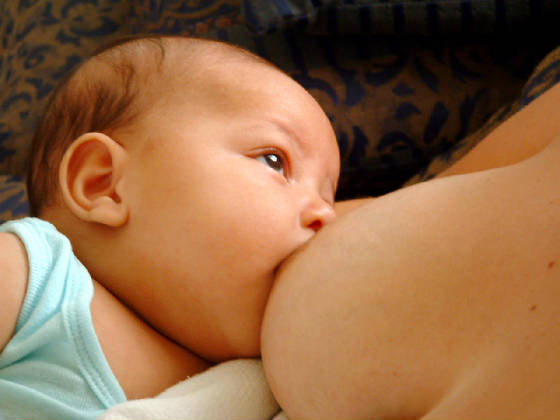
Much great information at WebMD.com. They say: "Breast milk provides the ideal nutrition for infants. It has the perfect
mix of vitamins, protein, and fat -- everything your infant needs to grow. And it's all provided in a form more easily digested
than infant formula. Breast milk contains antibodies that help your baby fight off viruses and bacteria. Breastfeeding reduces
your baby's risk of having asthma or allergies. Babies who are breastfed exclusively for the first six months, without any
formula, have fewer ear infections, respiratory illnesses, and bouts of diarrhea. They also have fewer hospitalizations and
trips to the doctor. Breastfeeding has been linked to higher IQ scores in later
childhood in some studies. The physical closeness, skin-to-skin touching, and eye contact all help your baby bond with
you and feel secure. Breastfed infants are more likely to gain the right amount of weight as they grow rather than become
overweight children. The AAP says breastfeeding plays a role in the prevention of SIDS (sudden infant death syndrome). It's
been thought to lower the risk of diabetes, obesity, and certain cancers as well but more research is needed to confirm these
findings." Much more great information at WebMD.com. |
 |
|
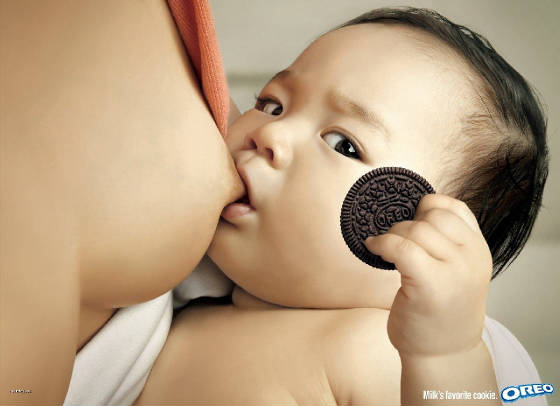
Wikipedia has much information at their site - Breast Milk. Again as in all of God's creation we see a myriad of high-tech, coordinated, inter-working
features. I thought their comment about so-called foremilk and hindmilk was great, showing that
the fat content of breast milk becomes fattier over time, obviously, miraculously keeping pace with the baby's changing needs. Also, that missing nutrients from the mother's food will be extracted from her reserves to provide for the baby. They say: "If nutrient supply is found lacking, content is obtained from the mother's
bodily stores. The exact composition of breast milk varies from day to day, depending on food consumption and environment,
meaning that the ratio of water to fat fluctuates. During the first few days after delivery, the mother produces colostrum.
This is a thin yellowish fluid that is the same fluid that sometimes leaks from the breasts during pregnancy. It is rich in
protein and antibodies that provide passive immunity to the baby (the baby's immune system is not fully developed at birth).
Colostrum also helps the newborn's digestive system to grow and function properly. Colostrum will gradually change to
become mature milk. In the first 3–4 days it will appear thin and watery and will taste very sweet; later, the milk
will be thicker and creamier. Human milk quenches the baby's thirst and hunger and provides the proteins, sugar, minerals,
and antibodies that the baby needs. In the 1980s and 1990s, lactation professionals (De Cleats) used to make a differentiation
between foremilk and hindmilk. But this differentiation causes confusion as there are not two types of milk. Instead, as a
baby breastfeeds, the fat content very gradually increases, with the milk becoming fattier and fattier over time.[26] 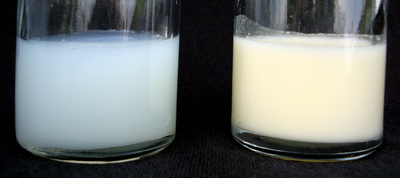 Two 25-milliliter samples of human breast milk. The lefthand sample is foremilk and the righthand sample is hindmilk. |
 |
|
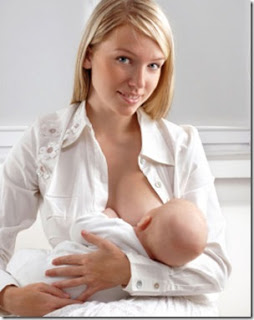
The level of Immunoglobulin
A (IgA) in breast milk remains high from day 10 until at least 7.5 months post-partum.[27] Human milk contains 0.8% to 0.9% protein, 4.5% fat, 7.1% carbohydrates, and 0.2% ash (minerals).[28]
Carbohydrates are mainly lactose; several lactose-based oligosaccharides have been identified as minor components. The fat
fraction contains specific triglycerides of palmitic and oleic acid (O-P-O triglycerides), and also quite a large quantity
of lipids with trans bonds (see: trans fat) that are considered to have a health benefit. They are vaccenic acid, and Conjugated
linoleic acid (CLA) accounting for up to 6% of the human milk fat.[29][30] The principal proteins are casein (homologous
to bovine beta-casein), alpha-lactalbumin, lactoferrin (apo-lactoferrin), IgA, lysozyme, and serum albumin. In an acidic environment
such as the stomach, alpha-lactalbumin unfolds into a different form and binds oleic acid to form a complex called HAMLET
that kills tumor cells. This is thought to contribute to the protection of breastfed babies against cancer.[31] Non-protein nitrogen-containing compounds, making up 25% of the milk's nitrogen, include urea, uric acid, creatine,
creatinine, amino acids, and nucleotides.[32][33]
Breast milk has circadian variations; some of the nucleotides are more commonly produced during the night, others during the
day.[34] Mother's milk has been shown to
supply a type of endocannabinoid (the natural neurotransmitters that marijuana simulates), 2-Arachidonoyl glycerol.[35] At one time it was thought that breast milk was sterile, however it is now known that it is more similar to cultured
yogurt, containing as many as 600 different species of beneficial bacteria. It is also now known that breast milk contains
a unique type of sugars, oligosaccharides, which are long chains of complex sugars. So far scientists have identified 140
of them and estimate there are about 200. These types of sugars are found nowhere else in nature, and not every mother produces
the same ones, since they vary by blood type. However, the oligosaccharides are not digestible by infants and are instead
meant to feed the beneficial bacteria that live in the intestine and help to fight infections. Also found in breast milk are
endo-cannabinoids, which may act as an appetite stimulant, but they also regulate appetite so infants don't eat too much.
That may be why formula-fed babies have a higher caloric intake than breastfed babies.[36] The breast milk of diabetic mothers has been shown to have a different composition from that of non-diabetic mothers.
It may contain elevated levels of glucose and insulin and decreased polyunsaturated fatty acids. A dose-dependent effect of
diabetic breast milk on increasing language delays in infants has also been noted, although doctors recommend that diabetic
mothers breastfeed despite this potential risk." Much more at Wikipedia's Breast Milk site. |
 |
|
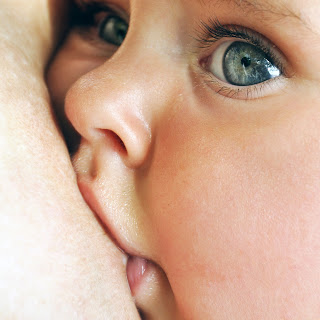
Genesis 21: (JFB commentary follows
this passage) 1 And the Lord
visited Sarah as he had said, and the Lord did unto Sarah
as he had spoken. 2 For Sarah
conceived, and bare Abraham a son in his old age, at the set time of which God had spoken to him. 3 And Abraham called the name of his son that was born
unto him, whom Sarah bare to him, Isaac. 4
And Abraham circumcised his son Isaac being eight days old, as God had commanded him. 5 And Abraham was an hundred years old, when his son
Isaac was born unto him. 6 And
Sarah said, God hath made me to laugh, so that all that hear will laugh with me. 7 And she said, Who would have said unto Abraham, that Sarah should
have given children suck? for I have born him a son in his old age. 8 And the child grew, and was weaned: and Abraham made a great feast the same day
that Isaac was weaned. 9 And
Sarah saw the son of Hagar the Egyptian, which she had born unto Abraham, mocking. 10 Wherefore she said unto Abraham, Cast out this bondwoman and
her son: for the son of this bondwoman shall not be heir with my son, even with Isaac. 11 And the thing was very grievous in Abraham's sight because of
his son. 12 And God said
unto Abraham, Let it not be grievous in thy sight because of the lad, and because of thy bondwoman; in all that Sarah hath
said unto thee, hearken unto her voice; for in Isaac shall thy seed be called. 13 And also of the son of the bondwoman will I make a nation, because
he is thy seed. 14 And
Abraham rose up early in the morning, and took bread, and a bottle of water, and gave it unto Hagar, putting it on her shoulder,
and the child, and sent her away: and she departed, and wandered in the wilderness of Beersheba.
Commentary Critical and Explanatory on the Whole Bible Robert Jamieson, A.R. Fausset, and David Brown, 1871 CHAPTER 21
| The angel visits Hagar - Genesis 21 |

|
|
|

